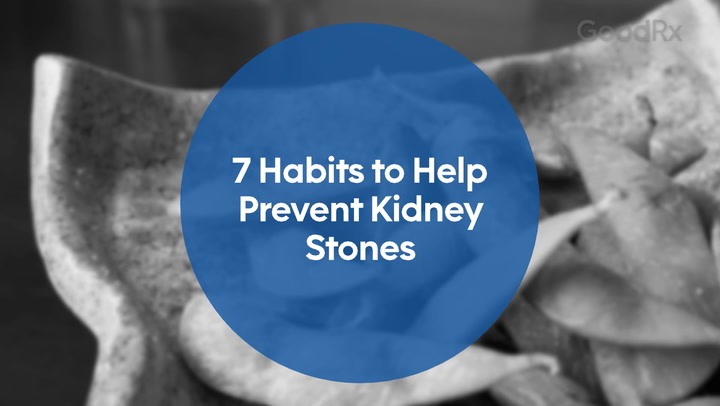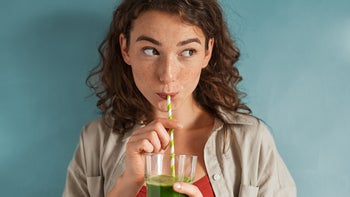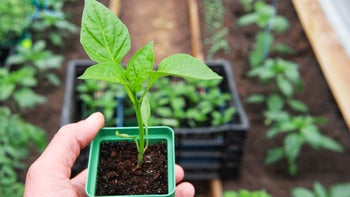Does Sea Moss Have Health Benefits? Or Is It Just a Fad?
Key takeaways:
Sea moss is a type of red seaweed that’s popular as a supplement. It comes in many forms including gel, gummy, powder, or pill.
The iodine, prebiotics, and antioxidants in sea moss may support thyroid health, gut function, and immunity. But more research on humans is needed to confirm these benefits.
Sea moss is safe for most people to take, but it's not entirely risk free. It can interfere with certain medications and cause digestive issues. And it can contain heavy metals if it’s not sourced carefully.
Table of contents

Sea moss is a buzzy wellness trend popular on social media. Influencers promote it for a long list of supposed health benefits. They claim it can boost your energy, improve libido, and clear your skin, among other things.
But are these claims true? Let’s take a look at what the research says about sea moss and what to know if you’re considering adding it to your routine.
What is sea moss?
Sea moss is a type of seaweed that grows along the Atlantic coasts of North America, Europe, and the Caribbean. Also known as Irish moss or red algae, sea moss has been used for centuries in traditional medicine.
Like other seaweeds, sea moss contains many nutrients, including:
Iodine
Magnesium
Iron
Potassium
But what makes sea moss unique is its texture. It forms a jelly-like substance when soaked. That gel-like quality comes from carrageenan, a natural fiber in sea moss.
Do natural treatments for hypothyroidism work? Natural remedies like supplements, herbs, and oils aren’t a cure. But they can help manage symptoms like fatigue and low energy.
What are the best foods for thyroid health? A registered dietitian shares what she eats to manage the symptoms of her hypothyroidism and Hashimoto’s disease.
Tips for choosing safe supplements: Over-the-counter (OTC) supplements aren’t regulated by the FDA the same way prescription medications are. These tips can help you make informed, safe choices.
Is sea moss good for you?
Sea moss contains vitamins, minerals, and antioxidants that can support your overall health. But it’s important to note that human studies on sea moss itself are fairly limited. Here’s what we know so far about the potential health benefits of sea moss.
Supports thyroid health
Sea moss is a natural source of iodine. Your thyroid gland needs iodine to make the hormones that regulate metabolism, energy, and mood. Not getting enough iodine can increase your risk of hypothyroidism. This is a condition in which your thyroid doesn't produce enough thyroid hormone.
Iodine deficiency is rare in the U.S. But you're at greater risk of it in these cases:
You don't use iodized salt.
You're pregnant (since pregnant people need about 50% more iodine).
You're vegan or eat few dairy or seafood products.
You eat high amounts of foods containing goitrogens. These are substances that make it harder for your body to produce thyroid hormone. Foods high in goitrogens include soy, cabbage, broccoli, cauliflower, and Brussels sprouts.
If you’re not getting enough iodine from your diet, supplementing with sea moss might help. But keep in mind that the amount of iodine in sea moss can vary widely. And getting too much can also be a concern (more on this below).
May boost immune function
Lab and animal studies suggest that sea moss has antiviral and antimicrobial properties. This is because sea moss contains sulfated polysaccharides. These are complex sugars that help fight off viruses and harmful bacteria by making it difficult for them to attach to and infect cells.
Sea moss also contains small amounts of nutrients that play a role in immunity, including:
Zinc
Vitamin C
And we know that seaweeds (as a broad category) contain other compounds — like amino acids and omega-3 fatty acids. These compounds have antioxidant, antiviral, and anti-inflammatory properties.
Still, we need more human research on sea moss specifically to understand how it affects the immune system in real life.
Can support gut health
Sea moss is rich in carrageenan, a type of fiber that acts as a prebiotic. Prebiotics support the good bacteria in your gut by serving as their food. By helping to maintain the balance of bacteria in your microbiome, prebiotics support digestion, immune health, and inflammation levels.
Note that carrageenan can be extracted from sea moss for use as a food additive. This processed version of carrageenan is common in packaged foods. And it has been linked to digestive issues. It is different from the naturally occurring carrageenan in sea moss and other seaweeds.
Contains antioxidants
Like other seaweeds, sea moss contains polyphenols and flavonoids, which are powerful antioxidants. Antioxidants are nutrients that help protect your body’s cells from damage caused by unstable molecules called free radicals. If too many free radicals build up, it can lead to oxidative stress. Over time, oxidative stress can cause inflammation and increase your risk of conditions including:
Cancer
Type 2 diabetes
Heart disease
Alzheimer’s and Parkinson’s disease
Sea moss isn’t a magic cure. But getting antioxidants in your diet from a variety of foods and drinks can help support your body’s defense system.
Sea moss nutrition facts
The exact nutrient content of sea moss varies depending on its form and where it’s harvested.
Here are the nutrients in 2 tbsp (30 g) of one popular brand of sea moss gel:
Calories: 15
Protein: 0.5 g
Fiber: 0.4 g (1% DV, or Daily Value)
Sodium: 20 mg (less than 1% DV)
Calcium: 22 mg (2% DV)
Iron: 2.7 mg (15% to 34% DV)
Magnesium: 43 mg (10% DV)
Potassium: 19 mg (less than 1% DV)
Phosphorus: 47 mg (4% DV)
How do you take sea moss?
You can take sea moss in different forms, including:
Gel: Sea moss gel is made by soaking and blending raw sea moss into a thick, smooth paste. It comes in many flavors, from strawberry to apple cinnamon. You can mix it into smoothies, teas, and juices. Or you can just eat it by the spoonful. Plain sea moss gel has an earthy, fishy taste. But the added flavoring masks the natural taste.
Gummies: Sea moss gummies can be a convenient, tasty option. But gummy supplements often contain added sugar as well as artificial and natural colors and flavorings. Many of these ingredients are linked to health concerns. And gummy vitamins are more likely to have unreliable dosing compared to other forms of supplements.
Bottled drinks: These beverages usually combine sea moss gel or sea moss extract with fruit juice and herbs. Just be sure to look for unsweetened options.
Capsule or powder supplements: You can stir sea moss powder into drinks or smoothies.
When choosing a sea moss supplement, make sure to pick one that has been third-party tested. This ensures a supplement is high quality and contains what its label says it does.
What are the downsides of sea moss?
Sea moss can be part of a healthy routine, but there are a few things to consider before taking sea moss.
Too much iodine
Sea moss is higher in iodine than other types of seaweed. Too much iodine can interfere with thyroid function. It may lead to hyperthyroidism, an overactive thyroid gland. If you already get iodine from other sources (like iodized salt or seafood), talk to a healthcare professional before taking a sea moss supplement.
Heavy metals
Like other seaweeds, sea moss may absorb heavy metals from the water where it grows. These heavy metals can include:
Arsenic
Cadmium
Lead
Heavy metal toxicity can cause oxidative stress and negatively impact metabolism. To make sure your supplement doesn’t contain contaminants, choose one that has been third-party tested. Companies that provide third-party testing include:
Look for a certification seal on the supplement label to see if it’s vetted by one of these companies.
Digestive issues
Some people experience bloating or mild digestive discomfort from the fiber in sea moss, particularly the carrageenan. Carrageenan may also trigger inflammation from inflammatory bowel disease (IBD).
Allergic reactions
Though rare, it’s possible to be allergic to sea moss or other types of algae. If you’re trying sea moss for the first time, start with a small amount.
Possible signs of an allergic reaction include:
Hives
Itching
Difficulty breathing
If you experience any of these, stop using sea moss and get immediate medical attention.
Interactions with medications
Certain people may need to avoid sea moss, including those who take:
Thyroid medications
Anticoagulant medications (blood thinners)
If you take these medications, and are considering adding sea moss to your routine, it’s a good idea to talk to a healthcare professional.
Frequently asked questions
Wild-harvested sea moss is the most nutrient-rich type of sea moss. It’s sourced from shores and beaches. It’s more nutrient dense than sea moss that grows in a lab (often called “cultivated sea moss” or “tank-grown sea moss”). When choosing a sea moss supplement, try to find one that’s free of:
Sugar
Artificial flavors
Dyes
You shouldn’t take sea moss if you're allergic to seaweed or iodine. If you have a thyroid condition or are on blood-thinning medication, talk to a healthcare professional before taking sea moss.
The bottom line
Sea moss is a popular supplement that contains iodine, prebiotic fiber, antioxidants, and other compounds that may support your thyroid, gut, and immune health. But most of the research on sea moss is in early stages. And some of the health claims marketers make about sea moss aren’t supported by science.
To choose a sea moss supplement, pick the form that best fits your budget and lifestyle. And be sure to choose a product that’s third-party tested. It’s a good idea to consult with a healthcare professional before taking sea moss if you have a thyroid condition or take blood-thinning medication.
Why trust our experts?



References
Babiker, A., et al. (2020). The role of micronutrients in thyroid dysfunction. Sudanese Journal of Paediatrics.
Borsani, B., et al. (2021). The role of carrageenan in inflammatory bowel diseases and allergic reactions: Where do we stand? Nutrients.
Darias-Rosales, J., et al. (2020). Risk assessment of iodine intake from the consumption of red seaweeds (Palmaria palmata and Chondrus crispus). Environmental Science and Pollution Research International.
Das, I. J., et al. (2024). Exploring carrageenan: From seaweed to biomedicine-A comprehensive review. International Journal of Biological Macromolecules.
Fu, Z., et al. (2020). The effects of heavy metals on human metabolism. Toxicology Mechanisms and Methods.
Khalifa, M., et al. (2021). “Fueling the fire” - Irish sea-moss resulting in Jod-Basedow phenomenon in a patient with Grave’s disease. Journal of the Endocrine Society.
Lopez-Santamarina, A., et al. (2020). Potential use of marine seaweeds as prebiotics: A review. Molecules.
Mahendran, S., et al. (2021). In vitro antioxidant study of polyphenol from red seaweeds dichotomously branched gracilaria Gracilaria edulis and robust sea moss Hypnea valentiae. Toxicology Reports.
Office of Dietary Supplements. (2024). Iodine: Fact sheet for health professionals. National Institutes of Health.
Park, S. (2024). An update on the chemical constituents and biological properties of selected species of an underpinned genus of red algae: Chondrus. Marine Drugs.
Reddy, V. P. (2023). Oxidative stress in health and disease. Biomedicines.
Rudtanatip, T., et al. (2018). Assessment of the effects of sulfated polysaccharides extracted from the red seaweed Irish moss Chondrus crispus on the immune-stimulant activity in mussels Mytilus spp. Fish & Shellfish Immunology.
Shaughnessy, B. K., et al. (2023). Evidence of elevated heavy metals concentrations in wild and farmed sugar kelp (Saccharina latissima) in New England. Scientific Reports.
Tamama, K. (2020). Potential benefits of dietary seaweeds as protection against COVID-19. Nutrition Reviews.
True Sea Moss. (n.d.). Sea moss gel superfood.

























